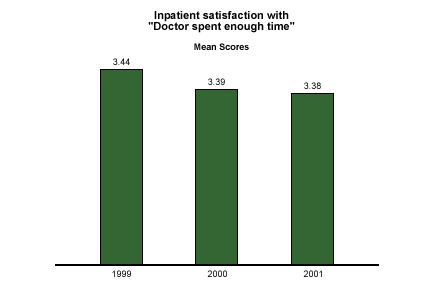Imagine a patient and family sitting in a hospital room, anxiously awaiting important medical test results. They try to get answers from the primary nurse, but are told that they can only receive this information from the doctor. Time passes. When the physician finally arrives, will he or she make the wait worthwhile?

Gallup's healthcare database shows a decline over the last three years among hospital inpatients in their satisfaction with the amount of time the doctor spends with them. When asked to rate this item on a scale of 1 to 4, the mean score has dropped from 3.44 to 3.38 over the past two years. What is causing this decline?
Under Pressure
One easy explanation is managed care's impact on physician practices. The Centers for Disease Control and Prevention (CDC) report that in 1999, 78.5 million people in the United States were enrolled in health maintenance organizations (HMOs), and this number has been steadily increasing.
Physician practices are typically reimbursed less for managed care patients than indemnity plan patients. Therefore, as more and more patients become enrolled in HMOs, physicians are reimbursed less for their services, and may therefore feel pressured to increase productivity by seeing more patients in shorter periods.
Not only may doctors spend less time with patients, but patients may also observe subtle clues that their doctors feel rushed. Doctors may have less personalized conversations with patients, allow less opportunity for patients or family members to ask questions, and have less patience in listening to what patients have to say. As one frustrated patient observed in a 2000 Gallup focus group, "How can you diagnose and treat me properly if you don't give me an opportunity to tell you what I know and what my concerns are?"
Hospitalist: Solution or Problem?
Hospitalists are a growing trend in healthcare and they provide a potential way to increase the amount of time that patients can spend with doctors. A hospitalist is a doctor -- employed by a physician group, hospital or managed care plan -- who makes only inpatient visits. For example, an orthopedic practice may employ one orthopedic surgeon to visit all of its patients at the hospital after surgery, rather than have each surgeon in the practice visit his or her own patients. That way, the individual surgeons focus only on surgeries and office visits, and the hospitalist handles all inpatient interaction.
The hospitalist is an attractive option to hospitals and managed care plans for several reasons. The hospitalist can serve as an expert coordinator of inpatient care, resulting in greater patient-care efficiency and more physician access for patients and families. For many family practitioners, pediatricians and other physicians, the use of a hospitalist is attractive because it allows them to concentrate solely on office or surgical practice. For other physicians, the use of a hospitalist is threatening because it reduces their control over their own patients' care.
Patient feelings about hospitalists could prove difficult to gauge. Hospitalists may be able to spend more time with inpatients than personal physicians can, but some inpatients may not like the idea of meeting with an unfamiliar physician. Although Gallup is still accumulating data on patient attitudes toward this new trend, we have observed declining inpatient satisfaction scores for at least one hospital that recently implemented a hospitalist program.
Conclusions
To no one's surprise, physicians are under ever increasing pressure by managed care organizations to improve productivity. One by-product of this pressure is likely to be patient dissatisfaction with the time physicians spend with them.
The hospitalist concept was designed to increase the amount of time that patients are able to spend with doctors and improve communication between doctors and patients. However, the introduction of a hospitalist could also reduce the satisfaction of inpatients expecting to see their personal physician while in the hospital, but are visited instead by a doctor they've never met.